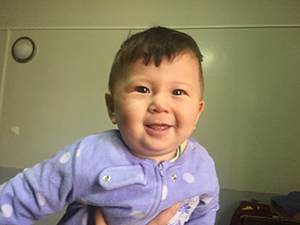Could a tube of diaper cream really make a profound difference in newborn’s health care?
In an ideal world, every new mother would receive health care before and after giving birth, and every baby would receive medical care from trained professionals. As part of AMOR’s vision, we’re always looking for ways for new mothers and their children to receive that care.
Case in point: postnatal checkups.
“It’s a cultural tradition in Afghanistan that births happen at home, with mother and child remaining under the care and protection of grandparents and relatives in the home, for up to 40 days after delivery,” said Davena Witcher, BSN and Executive Director of AMOR. She said AMOR has made great strides through health education in helping women to seek prenatal care and to give birth under medical supervision, with AMOR’s Afshar Hospital taking on higher-risk births.
But there’s one area where the challenges just haven’t seemed to budge. “We see thousands of mothers in our Community Outreach and Patient Education (COPE) clinics for prenatal visits, but very few of those mothers return to the clinic after giving birth for a postnatal checkup in the first week of an infant’s life,” Davena said. Postnatal visits are the first opportunity to assess the health of both newborn and mother. They mean early intervention for life-threatening but treatable conditions during their first days together.
How big is the issue? In October 2017, five of our Community Outreach Clinics saw 1,162 mothers-to-be for prenatal visits. But only 58 brought their newborns in for the standard one-week postnatal checkup. That’s a return rate of only 5 percent.
AMOR has tried any number of creative approaches to increase the rate, so newborns would receive the checkups they need. “Over the years, I couldn’t begin to list the ways we’ve tried to encourage postnatal visits,” Davena said. “We’ve offered new mothers meals, baby clothes, ear syringe kits… the list goes on and on. We’ve been trying creative approaches on this for years, but nothing seemed to increase the visits.”
Then, all of a sudden, the rate at which new mothers sought postnatal visits nearly doubled. In April 2018, the same five clinics saw 1,527 mothers-to-be for prenatal visits. But the number bringing their newborns in for postnatal checkups leapt to 134; a jump in the return rate from 5 to nearly 10 percent.
Why the change? Was this a tipping point, where AMOR’s efforts to Build Healthy Communities Worldwide were taking hold? What was the deciding factor?
“Diaper cream,” Davena said. “At the suggestion of COPE Clinic staff, we made a change to the support materials we give to new mothers, and included a tube of diaper cream. After that one change, new mothers and their babies are seeking postnatal visits at nearly twice the rate.”
So was a simple tube of diaper cream the key? Would a tube of Desitin soothe the way to a big change in health care for newborns?
“It’s fun to speculate that such a simple thing could make for such a profound change. You’d be surprised how often simple things like this can move the needle,” Davena said. “The reality is AMOR has been working for years to improve the health status of the communities we serve, including new mothers and their children in Afghanistan. And if a tube of diaper cream can help that to happen, it’s a good thing.”

